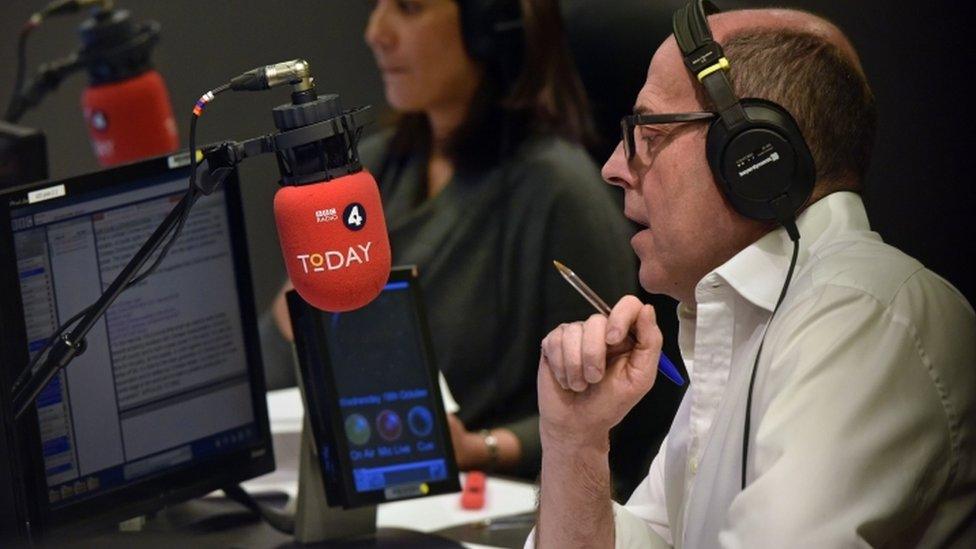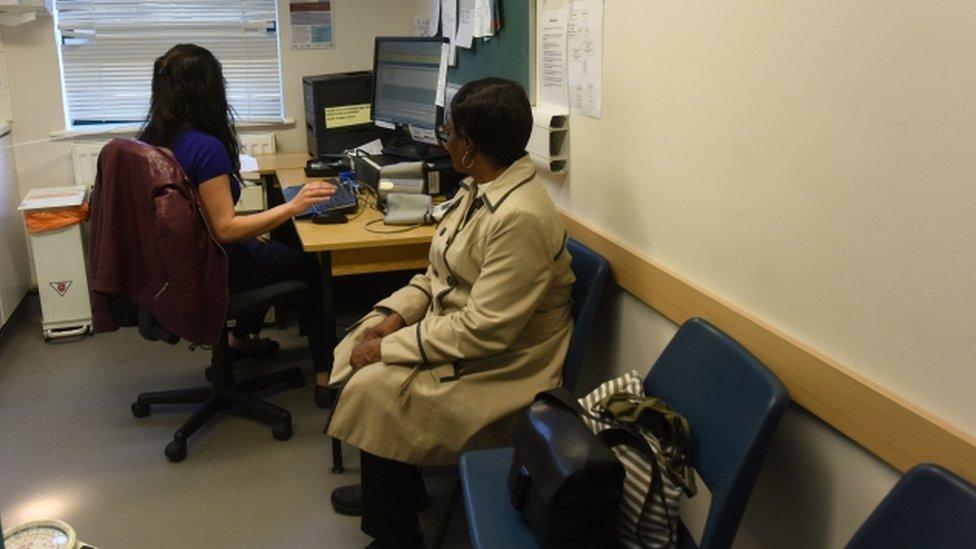'Let's be honest about the NHS'
- Published

Three years ago, Nick Robinson was diagnosed with cancer. The operation that successfully removed the tumour in his lung damaged his vocal cords. On Tuesday, he will present a debate about the future of the NHS at it approaches its 70th anniversary.
We can all delight in the fact NHS care is generally safer than in other systems - although the events at Gosport hospital are a reminder of the need not to be complacent - that it generally treats people with care and courtesy, is relatively cheap to run and gives the same level of care to rich and poor alike.
What, though, about those "healthcare outcomes" that put us "near the bottom" of the league table?
What, for example, about the illness I had - cancer?
Cancer survival rates here are significantly lower than in other countries. This is true not just of lung cancer but of other big cancer killers - in the bowel, in the colon, the pancreas and the prostate.
Indeed, in nine out of 10 cancers, the survival rates here are well below the European average.
In bowel cancer, we are 17th in the league table.
Put simply, put starkly, what that means is that tens of thousands of people with cancer survive for fewer years than they would if they lived in say Germany, France or the Netherlands.
BBC's Nick Robinson to have tumour removed
What will the NHS look like at 100?
The history of the NHS in charts
There have been great efforts to improve NHS cancer care. And some improvements are visible.
The detection and treatment of breast cancer has become significantly better in recent years - but there is a long way to go.
What's true of cancer is also true of the other big causes of death - heart attacks and strokes.
When it comes to tackling the most serious illnesses, the NHS is very far from being the best in the world.
"Aha," you might say, "surely the problem is obvious - money. We simply don't spend enough."
It is certainly true that the NHS has been through the longest, tightest financial squeeze in its history.
We spend less as a share of our national income on healthcare than they do in Germany or France.
We employ fewer people to care for us than they do in many other countries.
That is, no doubt, why the prime minister felt unable to resist the calls for a big boost to spending over the next five years.
Yet it is also true that we spend more than, say, the Irish or the Spanish and that our poor "healthcare outcomes" existed and were known about long before the age of austerity.
Yet in the decades I've been covering debates about the NHS, I have reported on endless rows about waiting times and waiting lists; on "reforms" and reorganisation; on allegedly secret plans to privatise the NHS but almost never on why it fails to keep people alive as well as other systems do.
I was lucky
There are, of course, no easy answers to that question.
Resources and organisation are surely a factor. Lifestyle, diet and public attitudes to health must all count too.

GPs are under intense pressure
When it comes to cancer, it is even possible that one of the jewels in the NHS crown - the GP system - may slow down the process of getting people to see the specialists they need to see to get the tests and the treatment they need.
I was very lucky. My cancer could have been diagnosed much later.
International surveys suggest people in the UK are more likely to say their doctor knows about them and their health - but they also indicate the time we get to spend with our doctor is much shorter than elsewhere.
I worry that as more and more GPs retire early and as the pressure on the system increases, that standard of care is bound to fall.
On average, people now see their GP six times a year, which is twice as often 10 years ago.
It is just one of the new pressures on the health service we will be examining in NHS at 70 - Live.
We will look at the impact of an ageing population. In the past five years, the number of people aged over 85 has risen by almost a third.
Their care costs on average five times more than that of someone under 30.
We'll explore the increase in obesity. A staggering 63% of us are now officially classified as obese or overweight - including half of all NHS staff.
Then there is the increased demand for mental health care - one in four adults now experiences a mental heath problem in their lifetime.
I have much to be thankful for. The tumour in my lung was removed successfully.
The damage to my vocal cords - which was a side-effect of the operation - almost robbed me of my voice. But another op and many many hours of therapy restored it so I could fulfil my career ambitions and become a presenter on the Today programme on BBC Radio 4.
Incidentally, my experience raises one more question we all too rarely discuss - should there be limits to what the NHS provides?
When it came to getting my voice back, I had no choice but to pay for that therapy since there was no way the health service could - or, probably, should - have paid for the daily therapy sessions needed to get me back to work in weeks and not months.
There will always be limits on what the system can afford.
I have known for a very long time how superb the NHS can be but also that it has limitations.
Car crash survivor
As an 18-year-old, I was the sole survivor in a fatal car crash in France.
I spent a week heavily sedated in a respiratory intensive care unit in Lille, unable to breathe for myself.
When I pulled through and was sent home, I was treated and cared for by superb NHS doctors, nurses, physio- and occupational therapists, who got me back on my feet.
I was also informed that I would have died if I'd had the same accident in Britain, as the facilities in France were simply better than the ones we had.
So, I'll be joining with all those wishing the NHS a happy 70th birthday next week.
I'm aware there'll be parties and even religious services to celebrate the birth of one of Britain's best-loved institutions.
I know that no politician with any hope of high office will dare to declare anything other than love for it and will insist that it's the best of British.
However, the birthday gift the health service deserves as it turns three score years and 10 is not just warm words or even the promise of more cash.
It is an open, honest, clear-headed diagnosis of its strengths and, yes, its weaknesses too.
That and a national conversation about how those who care for us can help more people live longer healthier lives.
Nick Robinson will be presenting NHS at 70 - Live, on BBC Two, on Tuesday at 20:00 BST.